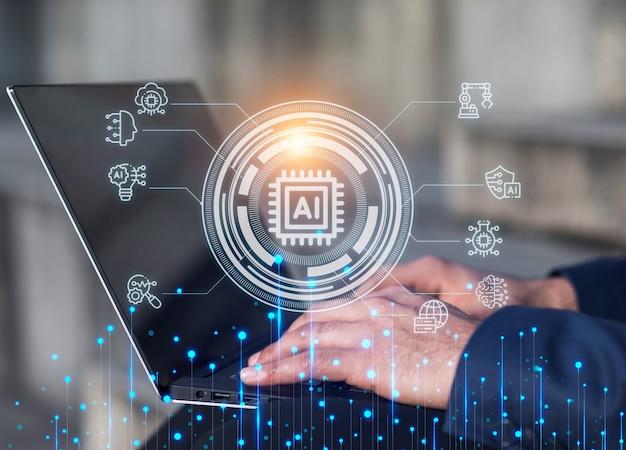AI And Machine Learning: How IC Chips Are Driving Innovation
AI and Machine Learning: How IC Chips Are Driving Innovation

Image source Freepik
Semiconductor chips are the drivers of the modern technology. Any product that has technologically advanced features is powered by and controlled by IC chips. This includes artificial intelligence (AI and machine learning (ML). These two technologies are closely related. They entail building and training solutions that carry out human-like functions.
In recent years, there has been massive growth in the AI and machine learning industries. Many products have been built on these two technological platforms. Some AI applications have even replaced human beings in their respective application areas. Even with the latest innovations, IC chips still play prominent roles in this growth. In this article, we are going to explore various ways in which IC chips are driving the growth of AI and machine learning. If you are building an AI and ML system, you will learn some valuable tips on how to choose the right IC chip for your application.
Data storage and management
AI and machine learning technologies are data-dependent applications. Every operation of these technologies entails the use of data. At the base is the collection and storage of data that will be used to train algorithms. For this to happen smoothly, there should be systems and mechanisms that support all types of data operations. This is where the importance of semiconductor chips comes in.
Data modules that are used in AI and ML industries are made of semiconductor chips. These modules have large data storage capacities. Since Artificial intelligence and machine learning are data-intensive applications, there is always a need to use modules that can support large volumes of data seamlessly.
Bend data storage, semiconductor chips are responsible for the management of data. They organize data structurally and avail it to the relevant applications when needed. This is an important aspect, especially in the AI and machine learning environment whereby the demand for data keeps varying. The chips are also used for making data interfaces, which support the exchange of data between different applications and systems. This is an important aspect of AI and machine learning whereby different parties are used for training data.
High processing power and speed
AI and machine learning applications require devices that have high processing capability. This is important right from the beginning of building an AI system to the implementation. Most AI applications are quite heavy or intensive. They need to process large datasets within microseconds and deliver the desired results to the users. This is possible only when there is a proper support system. In this context, support comes in the for of a microprocessor.
Semiconductor chips are the building blocks for the microprocessors. High end chips are designed to facilitate fast and effective processing of data, regardless of its volume or level of complexity. As the processor technology keeps advancing, the ripple effects are felt I the AI and ML industries. It motivates developers of machine learning models to build complex systems knowing very well that there will be systems to support data execution process.
Effective power management
Power management is one of the core functions of IC chips in hardware devices. Since AI and ML applications are built and even run on electronic devices, we can establish a direct relationship between the semiconductor chips and artificial intelligence in relation to the power management functionality.
One way of executing power management functionality is by enhancing energy efficiency of the devices. AI and ML are quite heavy and tend to use significant amounts of electric energy to run. The advancement of chip technology makes it possible for these applications to run smoothly without using too much energy.
Protection is another way in which semiconductor chips execute power management function in electronics. Chips are embedded with components such as diodes that shield excess current from reaching specific areas. Some electronic devices used in the development of AI and ML aplications depend on stored electric energy to run. OC chips make it possible to charge batteries that are used for storing electric energy.
Scalalibility in AI and ML
Artificial intelligence and machne learning technologies keep growing. Data that is used for training the moels keeps expanding. The power and capabilities of AI applications will always be on updard trajectory. This is made possible thanks to the scalability and flexibility of the integrated circuits.
In case your application needs a larger memory capacity, you will simply need to expand the capacity of the existing memory chips. You don’t have to buy a new device. Thanks to scalability and flexibility, you can expand the capability of the AI and ML applications without disrupting the operations of he existing systems.
Security in AI and machine learning
Anny development and innovation in AI is supported by high levels of security systems. Data that are used for training machine learning models should be well protected. The same applies to the AI applications that are used by end-users. They should be secured from unauthorized users.
There are special security chips whose core function is to secure data and applications. They provide different forms of security. Oe way of doing is by encrypting data that is stored in devices and applications. They also have authentication mechanisms whereby they determine who can access the system. Some chips have firmware that provide protection against malware.
AI has revolutionized IC manufacturing technology
We have just looked at various ways in which IC chips have revolutionized AI and ML technologies. But, do you know that these two technologies have also revolutionized the IC chip manufacturing industry? There are various ways in which the semiconductor industry has been greatly improved by AI and machine learning.
AI-powered chip design
Advanced AI applications are capable of designing semiconductor chips. They have been trained using chunks of data and machine learning algorithms to produce intricate designs of semiconductor chips. If you are keen on the IC chip production process, chances are you are already aware of how complex the process is. Furthermore, it is a job that should be done by experts only.
Thanks to AI and machine learning, designers can come up with optimized designs for semiconductor chips. This not only saves time but also the resources that are required for designing the chips. Furthermore, AI-powered chip designs tend to exhibit high levels of accuracy. They require minimal corrections and rectifications once they have been produced.
AI in IC chip production
Another way in which AI has revolutionized the IC chip industry is in the production of these chips. Thanks to AI, various aspects of production are fully automated. This eliminates the need and cost of involving human labor during the manufacturing process. It reduces the downtime that affects the rate of chip production. This ensures that products can reach on market in good time. By enhancing accuracy in the IC manufacturing process, AI and ML help to improve the overall quality of the semiconductor chips.
Beyond production, AI is also used in the repair and maintenance of semiconductor chips. They rely on their ML algorithm to detect anomalies on the surface of the chips and trigger the required warnings. The overall impact is an efficient chip production process.
Data and resource management
Massive resources are used in the manufacturing of semiconductor chips. The good news is AI technology is perfectly curated to maximize the usage of these resources. First, the machine learning algorithms ensure that all the data that is needed in the chip production is availed. The algorithms can scan through large datasets and deliver the exact information that you need.
Beyond the production phase, AI and machine learning play a crucial role in the distribution of IC chips. They are used for conducting comprehensive data analysis. This information is then used for analyzing the current market trends and predicting the future behavior of the market.
In short, these are just the many ways in which AI and machine learning are revolutionizing the production and distribution of semiconductor chips. Whether you are a manufacturer, distributor or marketer of semiconductor chips, there is a high chance that you will utilize the power of AI and machine learning to do some tasks.
Conclusion
In short, IC chips have played a big role in shaping the AI and machine learning industries. They are the real drivers of innovation in these two industries. These chips provide high-level computational power, enhanced data management, fast-processing capabilities, high-level power management, and even better interconnections. All these are very relevant in the fields of artificial intelligence and machine learning. The fact that IC technology keeps growing and advancing with time means that we should still expect the best results in this field.
Are you building AI and machine learning systems? It is always advisable to get the best integrated circuits that will be used in these fields. The surest place to find such chips is from reliable semiconductor chip distributors. This is where Rantle East Electronic comes in. We are a global distributor of IC chips that are designed for AI and machine learning applications. Contact us directly and we will be glad to work with you.
Kevin Chen
Founder / Writer at Rantle East Electronic Trading Co.,Limited
I am Kevin Chen, I graduated from University of Electronic Science and Technology of China in 2000. I am an electrical and electronic engineer with 23 years of experience, in charge of writting content for ICRFQ. I am willing use my experiences to create reliable and necessary electronic information to help our readers. We welcome readers to engage with us on various topics related to electronics such as IC chips, Diode, Transistor, Module, Relay, opticalcoupler, Connectors etc. Please feel free to share your thoughts and questions on these subjects with us. We look forward to hearing from you!







 Start With
Start With Include With
Include With


